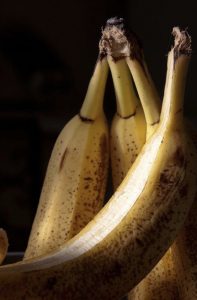Bananas are extremely healthy and delicious.They contain several essential nutrients and provide benefits for digestion, heart health and weight loss. Aside from being very nutritious, they are also a highly convenient snack food.

Here are 11 science-based health benefits of bananas
1. Bananas Contain Many Important Nutrients
Bananas are among the world’s most popular fruits. Native to Southeast Asia, they are now grown in many warm parts of the world. Bananas vary in color, size and shape. The most common type is the Cavendish, which is a type of dessert banana. Green when unripe, it yellows as it matures. Bananas contain a fair amount of fiber, as well as several antioxidants.
One medium-sized banana (118 grams) also boasts:
- Potassium: 9% of the RDI
- Vitamin B6: 33% of the RDI
- Vitamin C: 11% of the RDI
- Magnesium: 8% of the RDI
- Copper: 10% of the RDI
- Manganese: 14% of the RDI
- Net carbs: 24 grams
- Fiber: 3.1 grams
- Protein: 1.3 grams
- Fat: 0.4 grams
Each banana has only about 105 calories and consists almost exclusively of water and carbs. Bananas hold very little protein and almost no fat. The carbs in green, unripe bananas consist mostly of starch and resistant starch, but as the banana ripens, the starch turns into sugar (glucose, fructose and sucrose).
SUMMARY Bananas are rich in fiber, antioxidants and several nutrients. A medium-sized banana has about 105 calories.
2. Bananas Contain Nutrients That Moderate Blood Sugar Levels
Bananas are rich in pectin, a type of fiber that gives the flesh its spongy structural form. Unripe bananas contain resistant starch, which acts like soluble fiber and escapes digestion. Both pectin and resistant starch may moderate blood sugar levels after meals and reduce appetite by slowing the emptying of your stomach. Furthermore, bananas also rank low to medium on the glycemic index (GI), which is a measure — from 0–100 — of how quickly foods increase blood sugar levels. The GI value of unripe bananas is about 30, while ripe bananas rank at about 60. The average value of all bananas is 51 This means that bananas should not cause major spikes in blood sugar levels in healthy individuals. However, this may not apply to people with type 2 diabetes, who should probably avoid eating a lot of well-ripened bananas — and monitor their blood sugar carefully if they do.
SUMMARY Bananas can help moderate blood sugar levels after meals and may reduce appetite by slowing stomach emptying.
3. Bananas May Improve Digestive Health
Dietary fiber has been linked to many health benefits, including improved digestion. A medium-sized banana has about 3 grams of fiber, making bananas a fairly good fiber source.
Bananas contain two main types of fiber:
- Pectin: Decreases as the banana ripens.
- Resistant starch: Found in unripe bananas.
Resistant starch escapes digestion and ends up in your large intestine, where it becomes food for the beneficial bacteria in your gut. Additionally, some test-tube studies propose that pectin may help protect against colon cancer.
SUMMARY Bananas are fairly rich in fiber and resistant starch, which may feed your friendly gut bacteria and safeguard against colon cancer.
4. Bananas May Aid Weight Loss
No study has directly tested the effects of bananas on weight loss. However, bananas do have several attributes that should make them a weight-loss-friendly-food. For starters, bananas have relatively few calories. An average banana has just over 100 calories — yet it is also very nutritious and filling. Eating more fiber from vegetables and fruits like bananas has repeatedly been linked to lower body weight and weight loss. Furthermore, unripe bananas are packed with resistant starch, so they tend to be very filling and may reduce your appetite.
SUMMARY Bananas may aid weight loss because they’re low in calories and high in nutrients and fiber.
5. Bananas May Support Heart Health
Potassium is a mineral that is essential for heart health — especially blood pressure control. Despite its importance, few people get enough potassium in their diet. Bananas are a great dietary source of potassium. One medium-sized banana (118 grams) contains 9% of the RDI. A potassium-rich diet can help lower blood pressure, and people who eat plenty of potassium have up to a 27% lower risk of heart disease.Furthermore, bananas contain a decent amount of magnesium, which is also important for heart health.
SUMMARY Bananas are a good dietary source of potassium and magnesium — two nutrients that are essential for heart health.
6. Bananas Contain Powerful Antioxidants
Fruits and vegetables are excellent sources of dietary antioxidants, and bananas are no exception. They contain several types of potent antioxidants, including dopamine and catechins. These antioxidants are linked to many health benefits, such as a reduced risk of heart disease and degenerative illnesses. However, it is a common misunderstanding that the dopamine from bananas acts as a feel-good chemical in your brain. In reality, dopamine from bananas does not cross the blood-brain barrier. It simply acts as a strong antioxidant instead of altering hormones or mood.
SUMMARY Bananas are high in several antioxidants, which may help reduce damage from free radicals and lower your risk of some diseases.
7. Bananas May Help You Feel More Full
Resistant starch is a type of indigestible carb — found in unripe bananas and other foods — which functions like soluble fiber in your body.As a rule of thumb, you can estimate that the greener the banana, the higher its resistant starch content. On the other hand, yellow, ripe bananas contain lower amounts of resistant starch and total fiber — but proportionally higher amounts of soluble fiber. Both pectin and resistant starch offer appetite-reducing effects and increase the feeling of fullness after meals.
SUMMARY Depending on ripeness, bananas harbor high amounts of resistant starch or pectin. Both may reduce appetite and help keep you full.
8. Unripe Bananas May Improve Insulin Sensitivity
Insulin resistance is a major risk factor for many of the world’s most serious diseases, including type 2 diabetes. Several studies reveal that 15–30 grams of resistant starch per day may improve insulin sensitivity by 33–50% in as few as four weeks. Unripe bananas are a great source of resistant starch. Therefore, they may help improve insulin sensitivity. However, the reason for these effects is not well understood, and not all studies agree on the matter. More studies should be conducted on bananas and insulin sensitivity.
SUMMARY Unripe bananas are a good source of resistant starch, which may improve insulin sensitivity. However, more research is needed.
9. Bananas May Improve Kidney Health
Potassium is essential for blood pressure control and healthy kidney function. As a good dietary source of potassium, bananas may be especially beneficial for maintaining healthy kidneys. One 13-year study in women determined that those who ate bananas 2–3 times per week were 33% less likely to develop kidney disease. Other studies note that those who eat bananas 4–6 times a week are almost 50% less likely to develop kidney disease than those who don’t eat this fruit.
SUMMARY Eating a banana several times a week may reduce your risk of kidney disease by up to 50%.
10. Bananas May Have Benefits for Exercise
Bananas are often referred to as the perfect food for athletes largely due to their mineral content and easily digested carbs. Eating bananas may help reduce exercise-related muscle cramps and soreness, which affect up to 95% of the general population. The reason for the cramps is largely unknown, but a popular theory blames a mixture of dehydration and electrolyte imbalance. However, research gives mixed findings about bananas and muscle cramps. While some studies find them helpful, others find no effects. That said, bananas do provide excellent nutrition before, during and after endurance exercise.
SUMMARY Bananas may help relieve muscle cramps caused by exercise. They also provide excellent fuel
for endurance exercise.
11. Bananas Are Easy to Add to Your Diet
Not only are bananas incredibly healthy — they’re also one of the most convenient snack foods around. Bananas make a great addition to yogurt, cereal and smoothies. You can even use them instead of sugar in your baking and cooking. Furthermore, bananas rarely contain any pesticides or pollutants due to their thick protective peel. Bananas are incredibly easy to eat and transport. They are usually well-tolerated and easily digested — they simply have to be peeled and eaten. It doesn’t get much easier than that.
SUMMARY Bananas make an excellent snack food, dessert or breakfast. Their versatility makes them easy to add to your diet.
The Bottom Line
Bananas are a popular fruit that happens to provide numerous health benefits.
Among other things, they may boost digestive and heart health due to their fiber and antioxidant content.
They may even aid weight loss, as they’re relatively low-calorie and nutrient-dense.
Ripe bananas are a great way to satisfy your sweet tooth. What’s more, both yellow and green bananas can keep you healthy and feeling full.
Written by Adda Bjarnadottir, MS on October 18, 2018




